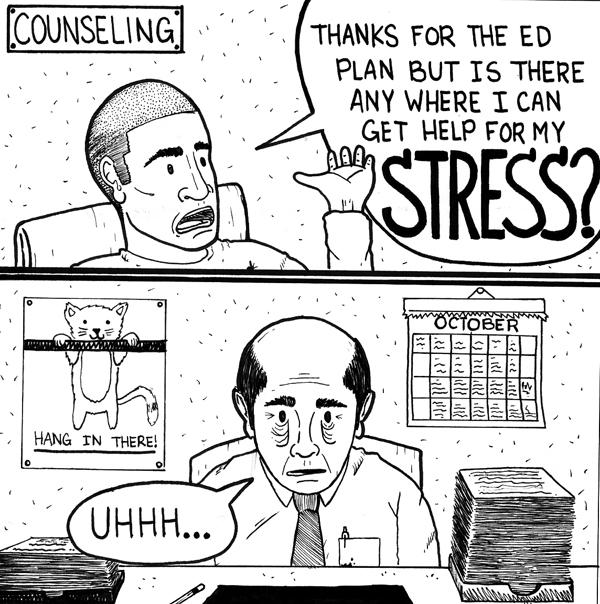Essential resource
Mental health center absent on campus, in student life
Oct 7, 2014
College is a stressful time in a person’s life.
The pressure to succeed, to achieve, to transfer and even just to pay for college can be overwhelming.
For many people, college is their first experience of actual autonomy.
Factor in added stressors such as having a job or a family, and it is far from a surprise that stress can have truly negative consequences on students.
There is no guarantee that providing a mental health center would prevent a person from hurting himself or others, but it does allow a college the opportunity to attempt to prevent such a tragedy.
Even starting the dialogue that someone may wish to consider seeing a mental health professional is a colossal step toward helping that person.
The issue of why allowing people who are suffering from any mental condition — no matter where on the severity spectrum it may lie — to continue suffering is a mistake that is multi-faceted.
Any form of mental distress can lead to a person dropping out of college. If that person was receiving financial aid and never returns to college, then society experiences an actual monetary loss.
Those connected to that person, be they friends or family, will undoubtedly have their lives impacted from seeing a loved one suffer, or the effects of the suffering may affect them.
Unfortunately, to whatever end, mental distress also has the possibility of ending in violence. This is a very real issue society has to examine.
Too often mental health issues are swept under the rug or covered up until they boil to the surface, as they did for Justin Liu, the young man who committed suicide on El Portal Drive near the Knox Center earlier this semester.
Readily accessible mental health assistance and professionals are two things that are absolutely necessary in today’s society.
People are not likely to seek help for problems that many ridicule as non-issues, yet they might if that help was convenient and free to receive.
And college is the perfect place to make mental help readily available. The age the average person enters college is right when children progress into adulthood. Many people discover love, sex, violence and alcohol or drugs for the first time, and have to deal with the stress of dealing with those problems on top of dealing with schoolwork.
The age the average person enters college is also around the time many serious conditions begin to make themselves apparent.
It is not the responsibility of the college to provide a mental health center, but it is a responsibility of the community to demand that one be present on campus for students.
Providing help when and where people need it not only betters the community, but it could quite literally save lives.


